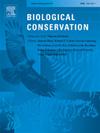对蝙蝠景观尺度分析的全球审查揭示了地理和分类方面的偏差以及新研究的机遇
IF 4.9
1区 环境科学与生态学
Q1 BIODIVERSITY CONSERVATION
引用次数: 0
摘要
景观尺度分析是一种不断发展的方法,用于量化景观结构(组成和配置)对重点物种的影响。蝙蝠是一个非常丰富和多样化的群体,它们使用的栖息地范围从细(0.5 千米)到宽(4 千米)不等,因此确定它们对不断变化的景观的反应可以突出各种管理影响。我们对来自五大洲的170项蝙蝠景观尺度研究进行了文献综述。我们使用聚类分析来突出研究趋势,并找出蝙蝠景观尺度研究中的偏差和知识空白。占现存蝙蝠多样性 51% 的蝙蝠科(Vespertilionidae)和蝙蝠属(Phyllostomidae)中的物种是三分之二研究的重点;其他科的代表性不足。热带和亚热带非洲和亚洲的蝙蝠物种丰富度较高,但在研究中的代表性不足。虽然只有少数研究考虑了与环境相关的人口数据,包括时间和行为参数(如年龄、季节),但这些数据对于解释蝙蝠与景观之间的相互作用非常重要。对于蝙蝠来说,没有一套放之四海而皆准的变量或尺度,即使是密切相关的物种对变量尺度组合的反应也各不相同。然而,量化栖息地大小和斑块边缘存在的变量往往是蝙蝠使用的有力预测因素。根据本综述,研究人员应该考虑一系列尺度,包括宽尺度(5 千米)、景观和生物气候变量,并为未来跨时间尺度的研究建立数据档案。我们提供了一系列建议,这些建议可以帮助研究人员和保护人员改进推论,以确定蝙蝠物种和其他类群的景观关联。本文章由计算机程序翻译,如有差异,请以英文原文为准。
A global review of landscape-scale analyses in bats reveals geographic and taxonomic biases and opportunities for novel research
Landscape-scale analysis is an evolving approach to quantify the effects of landscape structure (composition and configuration) on focal species. Bats—a remarkably rich and diverse group—use habitat from fine (< 0.5 km) to broad (> 4 km) scales, and thus identifying their responses to changing landscapes can highlight a variety of management implications. We conducted a literature review of >170 peer-reviewed studies from five continents of landscape-scale studies in bats. We used cluster analysis to highlight study trends and identify biases and knowledge gaps in landscape-scale studies of bats. Species in the families Vespertilionidae and Phyllostomidae, which represent 51 % of extant bat diversity, were the focus of two thirds of studies; other families were underrepresented. Tropical and subtropical Africa and Asia, notable for their high bat species richness, were underrepresented in studies. Although considered by few studies, context-dependent demographic data, including temporal and behavioral parameters (e.g., age, season) were important for explaining bat-landscape interactions. No one-size-fits-all set of variables or scales exists for bats, and even closely related species vary in their responses to variable-scale combinations. However, variables that quantify habitat size and presence of patch edges were often strong predictors of bat use. Based on this review, researchers should consider a range of scales including broad scales (>5 km), landscape and bioclimatic variables, and archiving data for future studies across temporal scales. We provide a list of recommendations that can help researchers and conservationists improve inferences in determining the landscape associations of bats species and other taxa.
求助全文
通过发布文献求助,成功后即可免费获取论文全文。
去求助
来源期刊

Biological Conservation
环境科学-环境科学
CiteScore
10.20
自引率
3.40%
发文量
295
审稿时长
61 days
期刊介绍:
Biological Conservation is an international leading journal in the discipline of conservation biology. The journal publishes articles spanning a diverse range of fields that contribute to the biological, sociological, and economic dimensions of conservation and natural resource management. The primary aim of Biological Conservation is the publication of high-quality papers that advance the science and practice of conservation, or which demonstrate the application of conservation principles for natural resource management and policy. Therefore it will be of interest to a broad international readership.
 求助内容:
求助内容: 应助结果提醒方式:
应助结果提醒方式:


